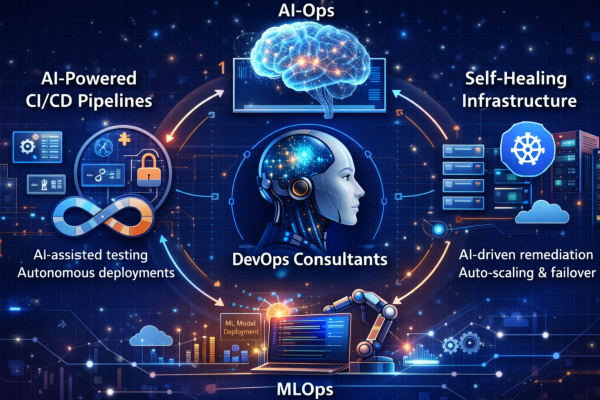How Do DevOps Consulting Services Streamline Cloud-Native Application Delivery?
As businesses shift to cloud-native technologies to meet demands for scalability and speed, many discover that simply moving applications to the cloud isn’t enough. Cloud-native applications—built using microservices, containers, and cloud services—require a complete transformation in how software is developed, tested, deployed, and managed. That transformation is often complex. DevOps Consulting Services play a critical role in making this shift successful.
These consulting services help businesses modernize their development workflows, reduce manual processes, increase automation, and ensure their cloud-native applications are delivered faster, more reliably, and more securely. In this blog, we will explore how DevOps Consulting Services simplify and accelerate cloud-native application delivery, going beyond the basics to examine the detailed methods and tools that make it possible.
Why Cloud-Native Delivery Is Different—and More Demanding
Cloud-native development is not just a technological change. It’s an operational shift. Applications are no longer monoliths that are deployed every few months. Instead, they are made of many loosely coupled microservices, each independently developed, deployed, and scaled. These apps often run in distributed cloud environments, depend on APIs, and integrate with multiple third-party services.
This complexity introduces new challenges:
- Microservices must communicate reliably and securely.
- Frequent code changes need automated validation and deployment.
- Infrastructure should scale dynamically based on demand.
- Monitoring and debugging in distributed systems become harder.
Trying to manage this manually or with outdated workflows leads to errors, delays, and higher costs. That’s why DevOps Consulting Services have become essential for cloud-native success.
Designing and Implementing Robust CI/CD Pipelines
At the heart of cloud-native delivery is the need for speed and automation. DevOps consultants prioritize the setup of Continuous Integration and Continuous Delivery (CI/CD) pipelines to automate the process of building, testing, and deploying code.
But this goes beyond basic scripting. DevOps experts assess your code repository structure, branching strategy, and build dependencies. They identify bottlenecks such as long-running tests or manual approvals and recommend tools tailored to your stack—such as GitHub Actions, GitLab CI, Jenkins, or Argo CD.
A well-built CI/CD pipeline enables:
- Automatic building and testing of code on every commit.
- Integration testing across microservices.
- Canary or blue-green deployments to reduce risk.
- Rollbacks triggered by automated health checks.
These pipelines are not “one-size-fits-all.” DevOps Consulting Services customize them to match your development practices, cloud provider, and compliance needs, ensuring that deployments are fast, traceable, and fail-safe.
Efficient Microservices Architecture Management
Cloud-native applications thrive on microservices architecture, where each function of the app is broken into smaller, independent services. While this offers speed and scalability, it also introduces operational overhead.
DevOps consultants help manage this complexity by:
- Establishing service boundaries: Identifying how to divide the app logically so each service is independently deployable yet part of a unified product.
- Implementing API gateways: For secure, controlled communication between services.
- Setting up service mesh frameworks: Like Istio or Linkerd, which handle service discovery, traffic management, and security at scale.
- Automating service registration and monitoring: So new services are immediately discoverable and observable.
Rather than leaving teams to guess how to split or manage services, DevOps experts define clear patterns and documentation for service creation, versioning, communication, and deprecation—preventing chaos as systems grow.
Advanced Containerization and Orchestration
Cloud-native delivery relies heavily on containers—usually Docker—for packaging applications. But running containers in production is not just about using Docker. It requires advanced orchestration, typically with Kubernetes.
DevOps Consulting Services assist not just with containerization, but with:
- Defining Dockerfile best practices to reduce image size, improve caching, and harden security.
- Creating Helm charts or Kubernetes manifests for declarative deployment of services.
- Establishing namespaces and role-based access control (RBAC) for secure multi-team environments.
- Building multi-tenant, multi-cluster strategies for enterprises with global deployments.
They also address production-readiness aspects like pod health checks, auto-restarts, graceful shutdowns, and persistent storage handling—all of which are critical to ensuring your containers run reliably in real-world conditions.
Infrastructure as Code (IaC) for Cloud Automation
Cloud-native environments are dynamic. Servers are spun up and down as needed. Resources are allocated based on real-time demand. Managing this manually is inefficient and error-prone. DevOps Consulting Services implement Infrastructure as Code (IaC) practices using tools like Terraform, AWS CloudFormation, or Pulumi.
But the real value comes in how they apply these tools:
- Modular code structures for reusability across environments (e.g., dev, staging, prod).
- Version control integration so changes to infrastructure are trackable and auditable.
- Automated provisioning pipelines where infrastructure changes are reviewed, approved, and applied like code.
- Validation and drift detection to identify when live infrastructure no longer matches the intended code.
By codifying cloud infrastructure, DevOps experts bring predictability, visibility, and security to your cloud environments—no more shadow IT or undocumented changes.
Unified Observability and Monitoring
Cloud-native applications often run on dozens of microservices distributed across multiple clusters and regions. Observing system health in such environments is complex, and traditional monitoring tools fall short.
DevOps consultants implement observability frameworks that provide three core pillars: metrics, logs, and traces.
- Metrics: Using Prometheus or similar tools, they gather real-time performance data on CPU, memory, latency, and throughput. These are visualized in Grafana dashboards, allowing teams to detect trends and anomalies.
- Logs: With centralized logging via the ELK (Elasticsearch, Logstash, Kibana) or EFK (Elasticsearch, Fluentd, Kibana) stack, logs from all services and containers are indexed and searchable.
- Traces: Distributed tracing tools like Jaeger or OpenTelemetry are integrated into services to understand request flows and pinpoint performance bottlenecks.
DevOps Consulting Services also define alerting rules, create runbooks, and set up incident response workflows—so teams can respond quickly and efficiently when something goes wrong.
Integrated Cloud Security (DevSecOps)
Security must not be an afterthought—especially in cloud-native delivery where changes happen rapidly and infrastructure is ephemeral. DevOps Consulting Services embed security directly into your pipelines and architecture, a practice known as DevSecOps.
This includes:
- Automated security scans of code (static analysis), dependencies (software composition analysis), and containers (image scanning).
- Infrastructure security policies that prevent misconfigurations (e.g., public S3 buckets, open ports) using tools like AWS Config or HashiCorp Sentinel.
- Access control hardening using identity and access management (IAM) policies, role-based access control, and least privilege principles.
- Secrets management through Vault, AWS Secrets Manager, or Kubernetes sealed secrets, ensuring sensitive information is encrypted and controlled.
By making security a continuous part of your delivery workflow, DevOps consultants reduce risk without slowing down innovation.
Scalability, Auto-Healing, and Cost Optimization
Cloud-native delivery is all about elasticity—applications must automatically adjust to changes in traffic, errors, or failures. DevOps Consulting Services design systems with this in mind.
They implement:
- Horizontal Pod Autoscaling in Kubernetes to adjust replicas based on CPU or custom metrics.
- Node autoscaling and provisioning based on overall cluster usage.
- Auto-healing configurations, such as readiness and liveness probes, that restart unhealthy services automatically.
- Load balancing and traffic routing across services and regions for performance and availability.
- Cloud cost monitoring using services like AWS Cost Explorer or third-party tools to identify underused resources.
These features ensure not only high performance and reliability but also responsible cloud spending—a critical factor in large-scale deployments.
Cultural Transformation and Agile Adoption
DevOps is not just about tools—it’s a cultural shift. DevOps Consulting Services focus heavily on breaking down silos between development, operations, security, and QA.
They guide teams through:
- Adopting agile workflows, with sprints, scrums, and backlog grooming.
- Shared ownership of code, infrastructure, and monitoring responsibilities.
- Cross-functional training to build T-shaped skills within teams.
- Collaborative tools like Jira, Slack, and Confluence that improve transparency and accountability.
This cultural transformation is key to unlocking the full potential of cloud-native delivery. When teams align on goals, processes, and tools, innovation flows naturally.
Why DevOps Consulting Services Make a Difference
It’s not difficult to buy a DevOps tool or set up a Kubernetes cluster. What’s difficult is doing it right—in a way that aligns with your team’s skills, business goals, and regulatory requirements.
DevOps Consulting Services bring:
- Real-world expertise from past implementations.
- Vendor-neutral guidance across AWS, Azure, and GCP.
- Customized strategies based on your current maturity and future vision.
- Time and cost savings by avoiding mistakes and accelerating delivery.
They help your team avoid trial-and-error and start delivering value immediately.
Conclusion
Cloud-native application delivery brings unmatched flexibility and speed—but also new levels of complexity. To truly benefit from this model, organizations must adopt automation, scalability, observability, and collaboration from day one.
DevOps Consulting Services serve as trusted partners in this journey. They don’t just recommend tools; they redesign your workflows, optimize your cloud architecture, embed security, and train your teams—resulting in an end-to-end solution for fast, secure, and scalable application delivery.
Whether you’re starting a new cloud-native project or trying to optimize an existing one, investing in professional DevOps Consulting Services could be the key to turning challenges into opportunities.
Author







